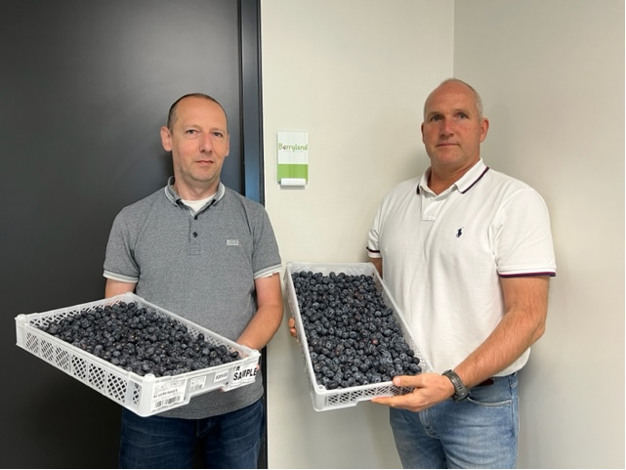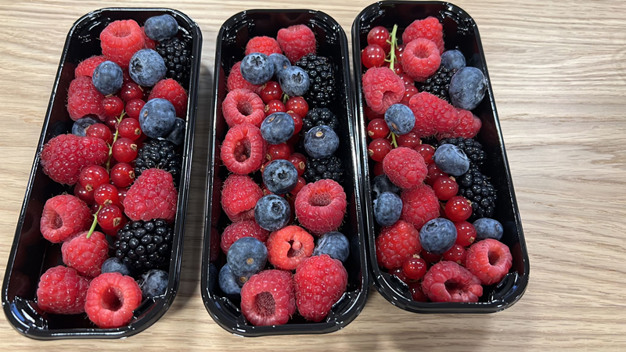With about 25 years of experience in fruit and exotics sales each, Theo Benjert and Rob Pakvis have jointly taken on a new challenge: Berryland. The Dutch company - it's all in the name - initially wants to focus on marketing the entire imported soft fruit package.

Theo Benjert and Rob Pakvis with Peruvian blueberries.
"That's our specialty, and that's also where our network of both growers and customers is," Rob begins. Although retailers are increasingly going directly to the source, he says there is definitely a need for a service supplier in the market. "I think 80% of our trade is pre-sorted."
"But growers must also deal with fruit that doesn't meet supermarket requirements regarding quality, variety, or size. Plus, there are times of shortage or oversupply when the fruit must be sold, too. That's where you need a bit of service supply. We can respond to that," says Rob.
"We know what we stand for and are an open book for clients and suppliers. For example, at the trade show in Madrid, we'll introduce buyers to growers and vice versa. They know what we're about, in good times and bad." Berryland targets the entire European retail market. "We already supply supermarkets in Ireland, Finland, the Netherlands, Germany, and Scandinavia," Rob explains.
Focus on soft fruit
"We focus on the whole soft fruit package. That consists of blueberries, raspberries, strawberries, blackberries, pineapple strawberries, black and redcurrants, and goji berries. But raspberries are our biggest item. From Morocco alone, we expect about 600 tons of these next year. We aren't focusing on Dutch soft fruit yet."
"Apart from greenhouse strawberries, our buyers in, say, Scandinavia and Germany focus mainly on those countries' local products during the summer. That requires so much attention that they don't request imported soft fruit. We can, thus, make good use of the summer to refuel and prepare for the import season. We're very busy with that for ten months of the year," says Pakvis.

Dutch strawberries.
The current blueberry market situation is extreme. "I've never experienced anything like this. Peru lost 30-35% of its crop earlier this year due to flooding; now, there's El Niño. Initial projections were that 40% more berries would be on the market, but that's completely gone. I foresee shortages on the market until November."
"What does worry me is the high prices. I don't think retailers will keep this up, and day traders are already becoming reluctant to buy. After all, gold can also be too expensive. Also, people sometimes forget that a country like Russia hasn't yet fully switched to Peru and still sources berries from closer by. That country will soon go full in," Rob continues.
He believes Peru will become even more important in the berry market. "Consider global berry production. Spain has a major water shortage and personnel problems. Morocco has experienced many adverse effects of climate change in recent years, which often cause far-below-par quality. And Chile missed the boat by focusing mainly on older varieties."
"Those berries may be cheaper, but everything has its price. I expect Peru to be the biggest market player within three to four years. With early and late varieties, Peru can already grow year-round. That country's growers can, thus, guarantee year-round work for their employees and reduce costs. Plus, Peru supplies rock-hard berries; I'm not concerned about that quality," Rob admits.
Plastic soft fruit packaging preferred
"We offer whatever packaging customers want; nothing is too outlandish. For instance, we can offer a unique mix of blueberries, raspberries, and blackberries in 125 g trays. Those are already very well-received in both Scandinavia and the United Kingdom. But soft fruit cannot do without plastic."
"Retailers all want to switch to cardboard, but you must examine that material's footprint. Soft fruit is mostly made up of water. Start packing in cardboard, and you dry out the fruit. It doesn't have to be expensive or difficult at all. Start with the basics; teach people how to handle plastic," Rob states, who still considers himself a great advocate of plastic soft fruit packaging.
 Mixed packs.
Mixed packs.
You can find Berryland at Cool Control's site in Maasdijk, the Netherlands. Where will it be in five years? "Above all, we'll still be doing what we do best. Using automation, we should manage to do much of the work for and with our growers and clients with two people. We're not ruling out expanding into other products. But the initial full focus is on the soft fruit package. We have our hands full with that for now."
"We don't avoid service items within that package, either," Rob states. "We have, for example, a Serbian blueberry grower who cultivates fresh goji berries, for which we handle sales. We know our way around the exotics segment, too, but we want to take it step by step.
"Most importantly, we want to tell growers and buyers the honest story. Making rapid strides undoubtedly works in the short term, but we're looking much more to the long term. That's also why we're so pleased with the trust growers and customers have in us. We look forward to successful partnerships," Rob concludes.
 For more information:
For more information:
Rob Pakvis
Berryland
70 Honderdland, Maasdijk, NL
Mob.: +31 (0) 683 431 868
Email: info@berryland.nl
www.berryland.nl
